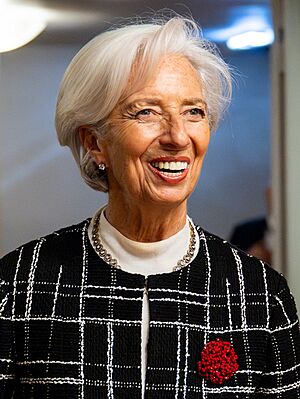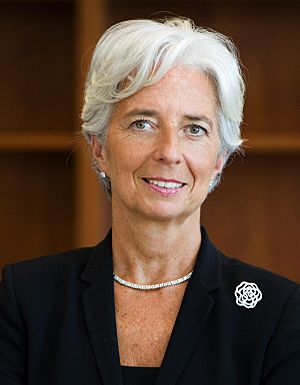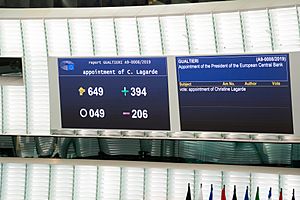Christine Lagarde facts for kids
Quick facts for kids
Christine Lagarde
|
|
|---|---|

Lagarde in 2024
|
|
| President of the European Central Bank | |
| Assumed office 1 November 2019 |
|
| Vice President | Luis de Guindos |
| Preceded by | Mario Draghi |
| Managing Director of the International Monetary Fund | |
| In office 5 July 2011 – 12 September 2019 |
|
| Deputy |
|
| Preceded by | Dominique Strauss-Kahn |
| Succeeded by | Kristalina Georgieva |
| Minister of Economics, Finance and Industry | |
| In office 19 June 2007 – 29 June 2011 |
|
| Prime Minister | François Fillon |
| Preceded by | Jean-Louis Borloo |
| Succeeded by | François Baroin |
| Minister of Agriculture and Fisheries | |
| In office 18 May 2007 – 18 June 2007 |
|
| Prime Minister | François Fillon |
| Preceded by | Dominique Bussereau |
| Succeeded by | Michel Barnier |
| Minister for Foreign Trade | |
| In office 2 June 2005 – 15 May 2007 |
|
| Prime Minister | Dominique de Villepin |
| Preceded by | François Loos |
| Succeeded by | Hervé Novelli |
| Personal details | |
| Born |
Christine Madeleine Odette Lallouette
1 January 1956 Paris, France |
| Political party | Union for a Popular Movement (2007–2011) |
| Other political affiliations |
European People's Party |
| Spouse |
Wilfried Lagarde
(m. 1982; div. 1992) |
| Children | 2 |
| Education | Paris Nanterre University Sciences Po Aix |
| Signature |  |
Christine Lagarde is a very important French politician and lawyer. Since 2019, she has been the President of the European Central Bank (ECB). Before that, she was the head of the International Monetary Fund (IMF) from 2011 to 2019. She also served as a minister in the Government of France, including as the Minister of the Economy, Finance and Industry. Christine Lagarde was the first woman to hold each of these big jobs.
She was born in Paris, France, in 1956. She studied law and became a successful lawyer. Later, she decided to work for the government and then for international organizations. She is known for her leadership during tough economic times.
Contents
Early Life and Education
Christine Lagarde was born in Paris, France, on January 1, 1956. Her parents were both teachers. Her father taught English, and her mother taught Latin, Greek, and French. Christine and her three younger brothers grew up in Le Havre.
As a teenager, Christine was a talented synchronised swimming athlete. She was even part of the French national team. After finishing high school in 1973, she went to the Holton-Arms School in the United States. While there, she worked as an intern at the United States Capitol, helping a politician. She later earned master's degrees in law from Paris Nanterre University and Sciences Po Aix.
Professional Career
Christine Lagarde started her career as a lawyer in 1981. She joined a large international law firm called Baker & McKenzie. She worked on important cases related to business rules and employment. She quickly moved up in the firm.
By 1999, she became the first woman to be the chairman of the entire company. She held this top position until 2004. She was known for focusing on what clients needed.
Government Roles in France
Lagarde returned to France to work in government. From 2005 to 2007, she was the Minister of Foreign Trade. Her goal was to find new markets for French products, especially in technology.
In 2007, she briefly served as the Minister of Agriculture and Fisheries. Soon after, she became the Minister of Economic Affairs, Finance and Employment. She was the first woman to be the finance minister of any Group of Eight (G8) country. During her time as finance minister, she helped guide France through the 2008 financial crisis. The Financial Times newspaper even called her the best finance minister in the Eurozone for her work.
Leading the International Monetary Fund
On July 5, 2011, Christine Lagarde was chosen to lead the International Monetary Fund (IMF). The IMF is an organization that helps countries around the world with their money problems. She was the first woman ever to be the head of the IMF. Many countries supported her for this role.
Her appointment came during a difficult time for Europe, as many countries faced debt problems. She was re-elected for a second five-year term in 2016. In 2016, a French court looked into a past event related to her time as minister, but she faced no punishment. She later left the IMF when she was nominated for a new role.
Important Views
Lagarde often spoke about the importance of countries managing their money well. She believed that countries needed to reduce their debt and spend wisely. She also talked about the need for European countries to work together during economic challenges.
She once said that the world economy was at risk and urged Europeans to unite. She also stressed that countries receiving help from the IMF needed to make changes to their economies.
"Payback" Discussion
In 2012, Lagarde made comments about the Greek government-debt crisis. She mentioned that some Greeks avoided paying taxes. She suggested that after a good time, it was "payback time" for them to fix their economy. These comments caused some debate. She later clarified that she felt great sympathy for the Greek people.
Loan to Argentina
In 2019, the IMF, under Lagarde's leadership, gave a large loan to Argentina. This loan was meant to help Argentina's economy. However, some people within the IMF worried it was too big for the country. The loan was given quickly to support the then-president of Argentina. This loan later led to a serious debt problem for Argentina.
President of the European Central Bank
On July 2, 2019, Christine Lagarde was chosen to become the next President of the European Central Bank (ECB). She officially started this role on November 1, 2019. The ECB is the central bank for the countries that use the euro currency. Her job is to manage the euro and keep prices stable in the Eurozone.
Experts believed she would continue the ECB's existing money policies. She also expressed interest in the ECB helping to fight climate change. She launched a major review of the ECB's policies, which had not been done in 17 years. As part of this, the ECB adopted a plan to address climate change.
In 2024, Lagarde spoke about the importance of countries following the EU's rules for managing their budgets. She emphasized that governments need to reduce their budget deficits and debt. In September 2024, she announced that the ECB would lower its main interest rate to help the Eurozone economy grow. She also stated that the ECB would not directly help individual countries with their economic reforms, as that is the job of governments.
Other Activities
Christine Lagarde has been involved in many other important groups. She is part of the European Systemic Risk Board, which looks at risks to the financial system. She has also been a member of the board for the Bank for International Settlements, which helps central banks work together.
She is also a member of the board of trustees for the World Economic Forum. This forum brings together leaders from around the world to discuss global issues.
Media and Recognition
Lagarde has been featured in various media. She was interviewed in the documentary film Inside Job. The fashion magazine Vogue also wrote about her.
An actress named Laila Robins played her in the TV movie Too Big to Fail. It is also said that parts of the character Miranda Priestly in the movie The Devil Wears Prada were inspired by Lagarde's elegant style.
Christine Lagarde has received many awards and honors for her work. Forbes magazine has consistently ranked her as one of the most powerful women in the world. In 2024, she was ranked as the second most powerful woman globally. She has also received special awards for her leadership and humanitarian efforts.
Awards and Honors
- She has been recognized many times by Forbes magazine as one of the world's most powerful women.
- In 2019, she received the CARE Humanitarian Award.
- She also received the Distinguished International Leadership Award in 2019.
- She has received high honors from France, including the Officer of the Legion of Honour.
- She has also received honorary doctorates from universities in Belgium and Canada.
Personal Life
Christine Lagarde has two sons, Pierre-Henri and Thomas, from her first marriage. Since 2006, her partner has been Xavier Giocanti.
She is a vegetarian and enjoys staying active. Her hobbies include going to the gym, cycling, and swimming. She speaks French, English, and Spanish. After becoming the ECB president, she planned to learn German.
See also
 In Spanish: Christine Lagarde para niños
In Spanish: Christine Lagarde para niños
 | Precious Adams |
 | Lauren Anderson |
 | Janet Collins |



